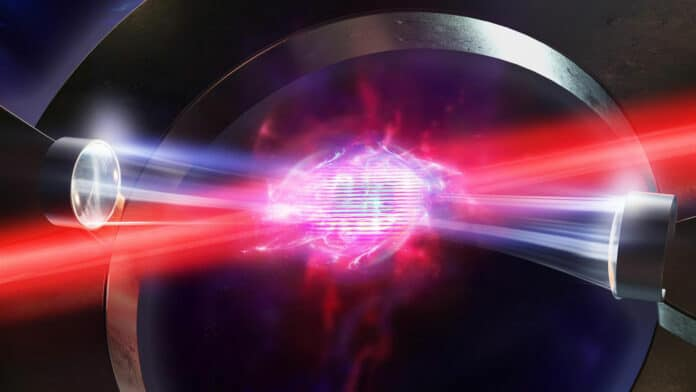Study demonstrates many-body chemical reactions in a quantum degenerate gas
In recent years, physicists have been trying to attain the control of chemical reactions in the quantum degenerate regime, where de Broglie wavelength of particles becomes comparable to the spacing between them. Theoretical predictions suggest that many-body reactions between bosonic reactants in this regime will be marked by quantum coherence and Bose enhancement, yet this has been difficult to validate experimentally.
Researchers at University of Chicago recently set out to observe these elusive many-body chemical reactions in the quantum degenerate regime. Their paper, published in Nature Physics, presents the observation of coherent, collective reactions between Bose-condensed atoms and molecules.
"The quantum control of molecular reactions is a fast-progressing research area in atomic and molecular physics," Cheng Chin, one of the researchers who carried out the study, told Phys.org.
"People envision applications of cold molecules in precision metrology, quantum information and quantum control of chemical reactions. Among all goals, quantum super-chemistry, is a major science goal. Over 20 years ago, researchers predicted that chemical reactions can be collectively enhanced by quantum mechanics when reactants and products are prepared in a single quantum state."
The enhancement of chemical reactions via quantum mechanical processes has been a long-sought research goal for some time now. These boosted chemical reactions, referred to as 'super reactions' closely resemble superconductivity or the functioning of lasers, yet with molecules instead of electrons or photons, respectively.
The primary objective of the recent work by Chin and his colleagues was to observe many-body super reactions in a quantum degenerate gas. To conduct their experiments, they specifically used Bose condensed cesium atom, a strongly electropositive and alkaline element that has frequently been used to develop atomic clocks and quantum technologies.
"Cesium atoms are chemically reactive at low temperatures and can be converted into a molecular Bose condensate with high efficiencies," Chin explained. "We monitored the dynamics of molecular formation in the atomic condensate and observed macroscopic quantum coherence between the atoms and molecules."
The team's experiments yielded a series of interesting observations. They found that super chemical reactions in the condensate caesium atoms were initially marked by the rapid formation of molecules. As they were shifting towards equilibrium, these molecules oscillated at different speeds. Samples with a higher density of atoms appeared to oscillate faster, hinting at a Bosonic enhancement of the reactions.
"Our work demonstrates new guiding principles for chemical reactions in the quantum degenerate regime," Chin said. "In particular, we show that all atoms and molecule can react collectively as a whole. Such many-body reactions promise controls to advance and reverse chemistry without dissipation, and to steer the reaction pathway into desired products."
The recent work by Chin and his colleagues contributes to the present understanding of quantum many-body chemical reactions, outlining a viable route to control these reactions at quantum degeneracy. In their paper, the researchers introduce a quantum field model that captures the key dynamics of these reactions well and could thus guide future experiments in this field of study.
"We now plan to identify new fundamental laws that govern chemical reactions in the quantum many-body regime," Chin added. "For instance, the condensed molecules are described by a single wavefunction and the phase of the wavefunction can hold the key to control the direction of the chemical reaction. In addition, we will be looking into many-body effects in the reactions of more complex, poly-atomic molecules."



Comments
Post a Comment